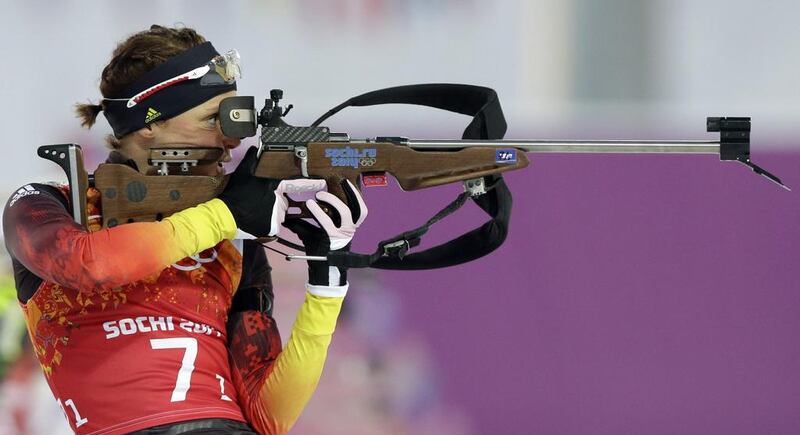SOCHI, RUSSIA // Germany’s two-time Olympic cross-country skiing champion Evi Sachenbacher-Stehle and the Italian four-man bobsleigh member William Frullani were thrown out of the Sochi Olympics on Friday after testing positive for drugs.
Sachenbacher-Stehle, who was competing in the biathlon in Sochi but did not win a medal, tested positive for the stimulant methylhexanamin, her second test sample confirmed on Friday.
Michael Vesper, secretary general of the German Olympic Committee, said the organisation “stands for a doping-free sport and a zero tolerance”. He added: “We only want clean performances. Every doping case is initially a disappointment, but also proof that the system works.”
Sachenbacher-Stehle, 33, was provisionally banned for five days before the start of the Turin 2006 Olympics for high levels of haemoglobin in her blood. She won gold in the team sprint free event at the 2010 Vancouver Olympics and 4x5km relay at the 2002 Salt Lake City Games.
She also won silver in the 4x5km relay in Turin and narrowly missed out on medals in Sochi, finishing fourth in the 12.5km mass start and the mixed relay.
“This is the worst nightmare you could imagine,” she told German media. “I can’t explain how the doping test could be positive.”
Frullani, a police officer by profession, was dropped from the team due to compete tomorrow after testing positive for the substance dymetylpentylamine, and left the village.
The substance, identified as a stimulant in the World Anti-Doping Agency (Wada) code, can be found in nasal decongestants.
Italian team officials said they had received a green light from the International Olympic Committee to replace Frullani, who had switched from track and field to bobsleigh in 2012, in their four-man bobsleigh team competing on the last day of the Games.
The two cases mean the Sochi Games have had more positive tests than the Vancouver 2010 Olympics, where only one athlete was caught for using prohibited substances.
The IOC said before the Olympics it was planning to carry out 2,453 tests during the Games, including 1,269 pre-competition controls, which is a record for a Winter Olympics. It has also increased pre-Olympic testing in the months leading up to the event, a move designed to stop cheats from getting to the Games.
Samples that are taken at the Sochi Olympics will be stored for a decade and re-tested in line with the new Wada code that comes into effect on January 1.
Germany, fifth in the medals table with eight golds and 16 medals in all, sent 154 athletes to Sochi. Italy, who have not yet won a gold, sent 114.
sports@thenational.ae





